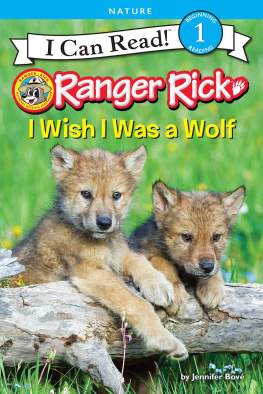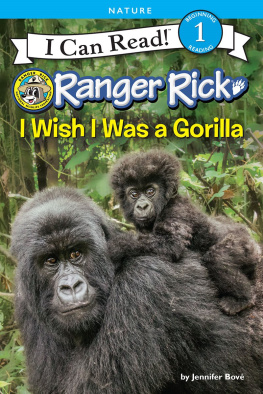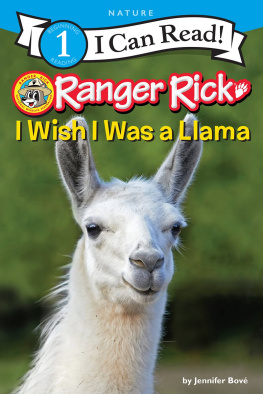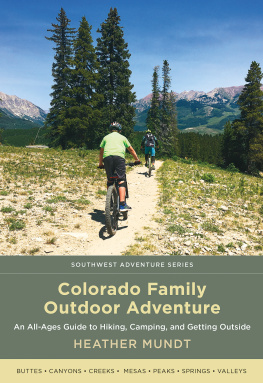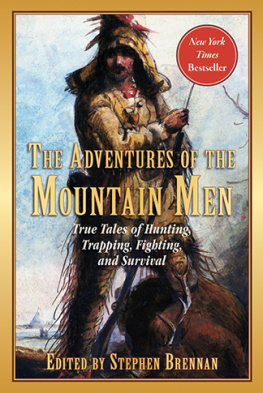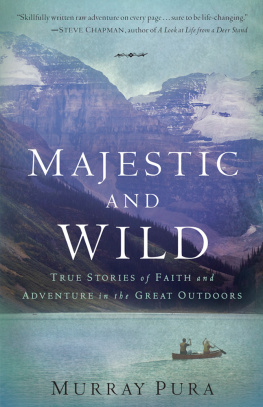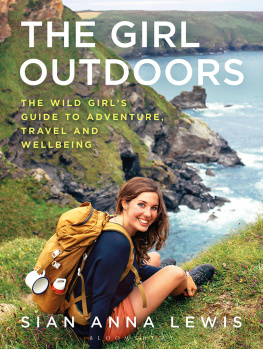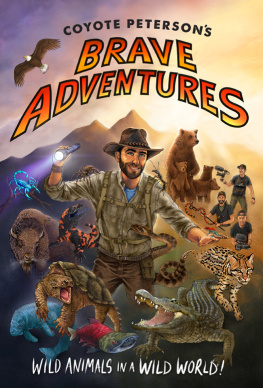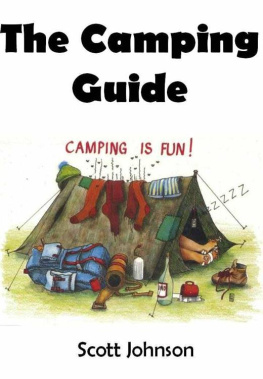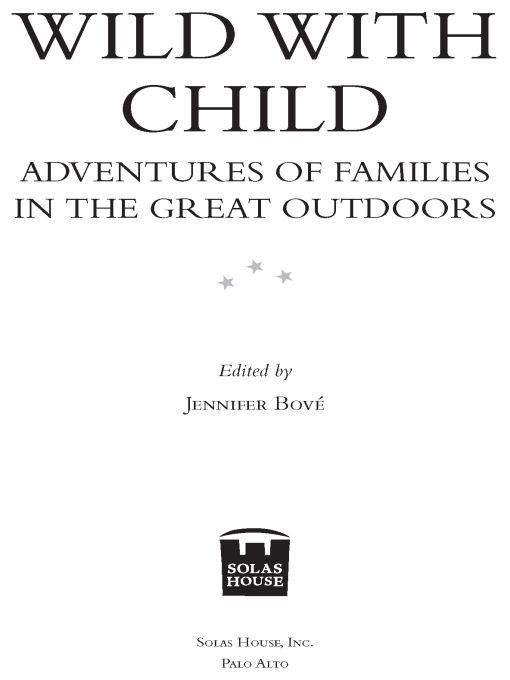Table of Contents
Foreword
Into the Wild
MARK JENKINS
Teal is frying salami in our snowcave, as is the tradition, the primal aroma curling through the small, icy enclosure. Fried salami is her invention. Three or four years ago, in another snowcave, she inexplicably wanted bacon for breakfast and being a good dad Id packed only oatmeal.
Oatmeal tastes like cardboard, she said, whereupon she crawled out of her sleeping bag, dug through the food, fished out a package of lunch salami and insisted I teach her how to light the little stove. She was seven years old and already a confirmed vegetarian, except during camping trips. Weve had fried salami for breakfast ever since.
Teal, eleven, and her sister Addi, thirteen, have been winter camping since they were toddlers. And not just with me; Sue, my wife, has taken them on numerous all-girl, no-boys-allowed winter excursions. Having done two expeditions a year for a quarter centurythe Andes to the Arctic, the Himalayas to the Hindu Kush, making a living from writing about these journeysI want them to experience the joy of becoming competent campers. Every spring, when the days are long and warm and pleasantly unwinterlike, we ski up into the Rockies, burrow out a snowcave, and camp. There is no agenda. Once we spent the better part of a brilliantly sunny day following marmot tracks around in the snow. Another time we played cards for hoursRummy, Speed, McGivers, Go Fishwhile an unexpected blizzard howled above us.
Heres a fact seemingly forgotten in our wired-wimpyshopping-mall world: kids are natural little outdoor people. It is we, the adults, that turn them into indoor people. If you dont get off your computer, why should they?
Being a parent (read: know-it-all) it has taken my daughters their entire lives to teach me the five basic tricks to taking kids into the wild.
One: get organized. If it takes you more than three hours to get out the door your kids will be moaning, the initial passion will have passed, and youll never go. Both my girls have an outdoor dresser in the basement stuffed with their own gearbackpack, sleeping bag, headlamp, survival kit, etc. Divide duties. One adult do the food, one do the camping gear, kids do their own personal accoutrement, clothes to compass (Dads rule in our household: only one stuffed animal per girl).
Two: give your kids responsibility. Once outside, let them lead, who cares if you get lost; it might be the best trip you ever have. Let them choose where to pitch the tent and figure out how to put it up. Let them cook, whats a singed finger or two? Stop telling them what to do. If they want to wear shorts and get eaten alive by mosquitoes, let em. Far as I can tell, one of the biggest mistakes were making in our urban existence is not letting kids make mistakes. The great outdoors is a fine place to give them the chance to make meaningful decisions, screw up, re-evaluate.
Three: stop worrying about whether they can handle it. You want the truth? Your kid is hardier than you are. I remember Addi, at age eight, making three portages with packs better than half her weight on a weeklong Boundary Waters canoe trip. Why? Because Sue explained that the best swimming hole on the planet was at the next lake. And, because we stopped and spent the rest of the afternoon there, it was. Kids are tough. Ever witness a child take a bad digger on the playground? Without adults around, hell get up, consider crying, but go back to playing instead.
(One caveat: there are trips I will not take children on, namely all those in which there are too many dangers out of my control. Class III or better whitewater, high altitude peaks, high avalanche-prone terrain, that sort of thing. You cant control nature, but you can choose your wilderness wisely.)
Four: fun. Forget your boring, goal-oriented adult approach. Kids just wanna have fun. So let them. No death marches to reach the next camp. Get sidetracked. Waste an hour with your nose two inches from a mountain tarn watching tadpoles. Catch a few. Play games. My girls love treasure hunts. Ill set up a little course where they have to take compass bearings to each new clue. Ever notice that when a child is having fun, she doesnt get cold or hungry or tired? The moment the fun stops, the whining starts.
A most important corollary to fun, is friends. One kid in the mountains with two adults is disaster. Let them bring a friend or two, youll thank God you did.
Finally, five: let them be wild. Gleefully throw out the rules we all live by in civilized society. I distinctly remember a marshmallow-roasting contest that got totally out-of-hand and both girls ended up with gooey smears of blackened marshmallow in their hair. (Kids adore dirt. Besides, cleanliness is a modern fetish. If they dont get dirty camping, youre doing something wrong.) Or the time we played chase around a small set of cliffs and pretty soon they were jumping off rocks ten feet high. Just short of injury, let em go. Hell, if you cant go wild in the wilds, where can you?
Kids are natural born adventurers. Inside every one of them is Huck Finn, just itching to get outside. Open the door and follow them out.
Formerly The Hard Way columnist for Outside magazine, Mark Jenkins is currently a field staff writer for National Geographic Magazine . His work has appeared in The Atlantic Monthly, National Geographic, GQ, Playboy, Mens Health, and dozens of other publications. His books are: Off the Map, To Timbuktu, The Hard Way, and A Mans Life. Mark also contributed The Snowcave and From the Mouths of Babes to this collection.
Introduction
Bright sky and towering treetops reflected in the stormy blue of my baby boys eyes, and I wondered how the world looked to him. To me, it was sublime: my son cradled on my lap and miles of forest surrounding us in every direction. At four days old, theres no way I would have exposed him to any public setting where people would sneeze, cough, and reach out to touch him. But even as fresh as he was, I felt entirely comfortable having him there, amid that sacred ground, where giant firs and clear river water offered respite on a hot July day, and ripe berries dotted lush green bushes like jewels.
As I wrapped Sam in his soft cloth sling and secured him against my chest, I could hear my daughters chattering and laughter as they bobbed through the brush with their grand-mother. Big Daddy was already off filling his bucket in earnest, hoping to bring home gallons of huckleberries for the freezer and determined to do it all on his own if he had to. For a moment, I could only stand still and breathe it in, the peace of the place and my people. Huckleberry picking, weve found, soothes some feral part of this family that paces its cage as we go through the motions of normal life. The simple act of wandering and harvesting food directly from its source reconciles us with our wild roots. The kids can scramble around for hours, playing or picking and nibbling with abandon, and at the end of the day theyre purple-stained forest critters, calm and unburdened, with just enough energy left to catch a quick river swim before exhaustion drags them down for naps. On those days, the calluses of more civilized obligations are stripped away, and our sensitivity of spirit is renewed.


